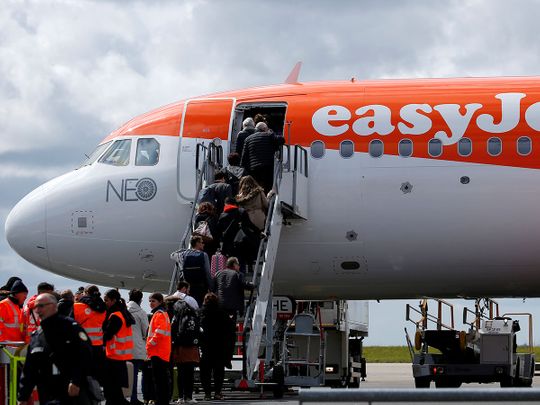
London: EasyJet plc expects to fly at no more than 10 per cent of normal capacity during the current quarter and withheld guidance for the year as it waits for coronavirus travel clampdowns to lift.
Europe's second-largest discount carrier posted an 88 per cent revenue drop for the three months through December, saying it's focused on holding down costs and remaining flexible to take advantage of a rebound when it comes. Hungarian rival Wizz Air Holdings Plc posted a 77 per cent revenue drop, and said it's bracing for a "tough few months" as capacity remains depressed.
No summer breakthrough
Airlines have been hunkering down in early 2021, paring back flight schedules and raising funds to hold on and prepare for a return in demand that's grown more elusive. Lockdowns in the UK and other European countries meant to stem a flare-up in virus cases have created uncertainty about the outlook for summer, the busiest part of the year.
The UK has banned all non-essential travel, closed travel corridors and mandated a negative coronavirus test within 72 hours of travel to enter Britain. It has also instituted a 10-day hotel quarantine for some incoming passengers.
"We know that restrictions like the quarantine are the single biggest barrier impacting customer bookings," EasyJet CEO Johan Lundgren said. "However, there are also some positive indicators" with vaccine rollouts.
EasyJet flew at about 18 per cent of 2019 capacity in the fiscal first quarter, with revenue dropping to 165 million pounds ($225 million) in the period. The Luton, England-based carrier has cut jobs, closed bases and taken loans against its aircraft to ride out the pandemic. It's also deferred the delivery of Airbus SE jets, after reporting its first annual loss in the year through September.
The company reduced its cash burn to 40 million pounds per week, it said Thursday.
Prepping
Smaller rival Wizz carried about 77 per cent fewer passengers in its fiscal third quarter. CEO Jozsef Varadi said he doesn't know when the crisis will be over, but has been bulding up fleet and network of bases to be ready for rapid expansion once the crisis eases.
"'When we emerge from this crisis the network is going to be much bigger than before and we are going to be taking advantage of the weakness of other airlines," Varadi said.
Aviation-travel demand could stay 60-80 per cent below pre-COVID-19 levels during the first-half, stressing airlines' balance-sheets as they deplete cash reseves, according to Bloomberg Intelligence analyst Rob Barnett. EasyJet and IAG SA are both burning cash but could raise more against owned aircraft, he said, while Wizz and Ryanair Holdings Plc "are the most prepared for a long period of limited flying".
All about slots
London Gatwick airport, where a number of carriers have pulled back during the downturn, remains a target for expansion, Varadi said. He has been frustrated by rule waivers that allow airlines to hang onto take-off and landing slots they are not using.
EasyJet, the south London hub's biggest operator, has acquired added slots from Norwegian Air Shuttle ASA, which is restructuring under Irish insolvency laws.
About 57 per cent of EasyJet's fleet of 338 planes was in storage as of January 19, according to data from aviation consultancy Cirium. The carrier pledged to maintain essential connections between key UK cities, alongside a small number of international markets, even as it largely suspends services.
This month, EasyJet said it had signed a five-year, $1.87 billion loan facility partially backed by a UK government guarantee. The carrier said Thursday that it repaid a $500 million revolving credit facility and term loans of about 400 million pounds, freeing up aircraft used as collateral.








